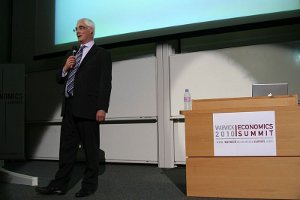Alistair Darling - Overview of Political History

Alistair Darling is primarily known as one of the three ministers who remained in the Cabinet during the entire 13-year Labour rule and as the man who revealed the British public that the country is about to face one of the deepest and most serious financial crisis after the mid-20th century. But he is also one of a few politicians from Tony Blair’s team who seem to enjoy respect and trust of the UK’s voters. In fact, as one of the British newspapers observes, he appears to be more popular than ever among the British voters. His political history, however, reveals that he has worked hard to earn the voters’ trust and to get to the point when his words are taken very seriously both by the public as well as his political colleagues.
Darling entered on the political scene in 1982 when he was elected as Councillor to the Lothian Regional Council. He worked as Councillor until 1987 and as Chairman of the Transport Committee from 1986 to 1987. He ran for Member of Parliament for Edinburgh Central against the sitting Member of Parliament from the Conservative Party, Sir Alexander Fletcher in 1987. He won but his Party remained in opposition. During his first term as Member of Parliament, he was chosen as opposition spokesman for Home Affairs. He ran for the second term as Member of Parliament for Edinburgh Central in 1992 and once again defeated his adversary. The Labour Party, however, was again defeated by the Conservatives. During his second term, Darling was opposition spokesman for Treasury Economic affairs and Shadow Chief Secretary to the Treasury between 1996 and 1997.
In 1997, he ran for his third term as Member of Parliament and won once again. This time, however, the voters gave their trust to the Labour Party that was led by Tony Blair who appointed Darling as Chief Secretary to the Treasury. In 1998, he became Secretary of State for Social Security. He and his party were victorious again at the 2001 General Election but this time Tony Blair appointed him as Secretary of State for Transport. While he held this office, the voters of the Trucker’s Weekly chosen him as Britain’s most boring politician two years in a row. But in an interview he gave for The Observer on 26th February 2012, he ironically noted that this can be considered as a compliment and that Secretary of State for Transport is interesting only if things are going wrong when he was reminded on the Trucker’s Weekly choice.
Both Darling and Labour Party succeeded in the 2005 General Election but this time he won as Member Parliament for Edinburgh South West because the seat for Edinburgh Centre was abolished. He was not, however, reappointed as Secretary of State for Transport but became the Secretary of State for Trade. In 2007, Gordon Brown who succeeded Tony Blair as Prime Minister appointed Darling as Chancellor of the Exchequer. He held the office until 2010 General Election when the Labour Party suffered one of its severest defeats in history. Darling, however, was re-elected as Member of Parliament for Edinburgh South West. He is currently the Labour Party’s Shadow Chancellor of the Exchequer.